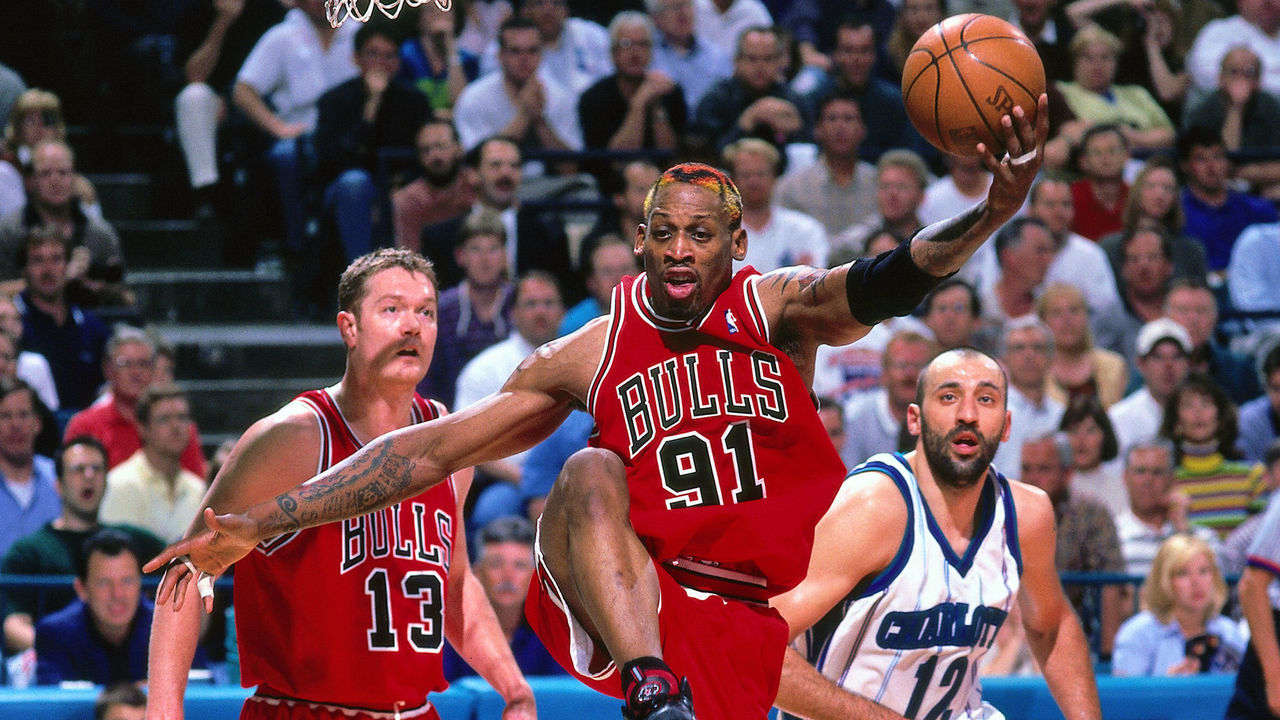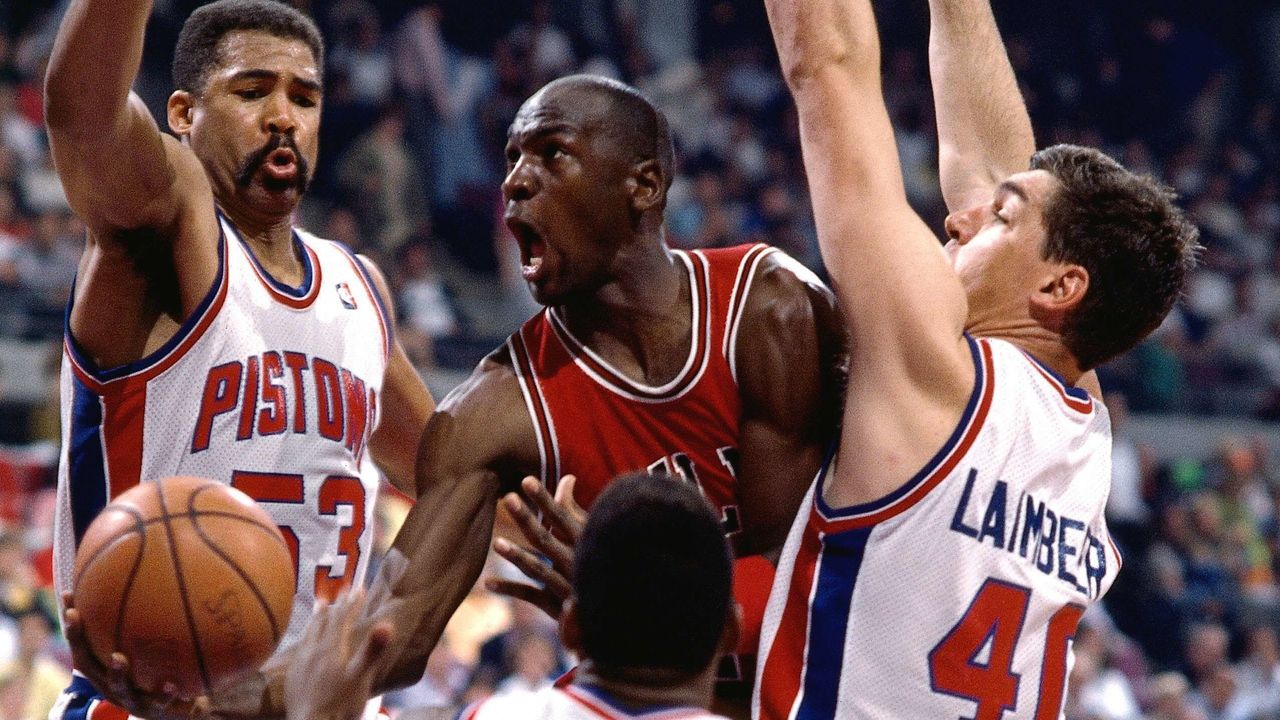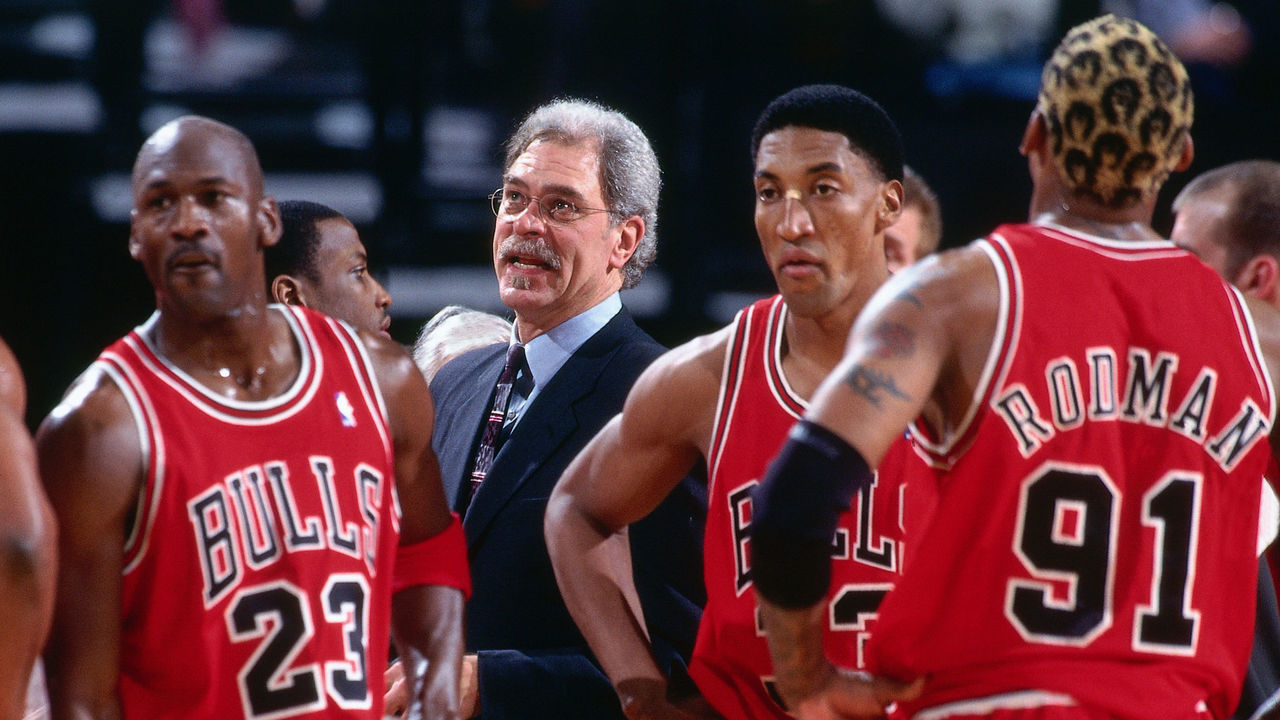'The Last Dance' takeaways: Episodes 3-4
Every week following the release of two new episodes of "The Last Dance," theScore will provide thoughts and observations from the most hyped and highly anticipated sports documentary in recent memory. Last week we covered episodes 1 and 2. This week, we're breaking down episodes 3 and 4.
Reminiscing about Rodman
Episode 3 of "The Last Dance" delves into the story of one of the most unique and (literally) colorful characters in NBA history, tracing Dennis Rodman's journey from humble beginnings to a storied career that included five championships, two Defensive Player of the Year awards, eight All-Defensive team selections, two All-Star appearances, two All-NBA nods, seven rebounding titles, and ultimately, an induction into Springfield.
Unlike most Hall of Famers, basketball isn't typically the first thing that comes up when discussing Rodman. These days, he tends to make the news because of his bizarre friendship with North Korean dictator Kim Jong-Un, and even when he was winning championships as the Bulls' third-most important player, his popularity was largely driven by intrigue and curiosity about his eclectic personality: his mosaically dyed hair, his piercings, his flamboyant sartorial style, and a dating life that included the likes of Madonna, Jeanie Buss, and Carmen Electra. Beyond what he did on the court, "Worm" became a paragon of self-expression and one of the pre-eminent countercultural icons of the 1990s.
There's been a lot of talk about how wild it would be if some of the things that happened to those Bulls teams back in the 90s were to happen in today's media-saturated age. Rodman taking a team-sanctioned leave of absence in the middle of the 1997-98 season in order to go on a 48-hour bender in Las Vegas is one of the first moments that come to mind.

But Rodman's reputation as an enigmatic, rebellious playboy clouded the depth of his commitment to the craft; the way he rigorously studied film in order to understand every type of spin and angle and carom, every opponent tendency, on his way to becoming one of the great defenders and maybe the single greatest pound-for-pound rebounder of all time. His ability to guard all five positions, and the fact that he preferred to use his boundless energy to crash the boards, fight for loose balls, and be a world-class defensive pest rather than try and put the ball in the basket, made him the perfect complement to Michael Jordan and Scottie Pippen.
Beyond his underrated basketball intelligence, Rodman was a supernatural athlete with inexplicable physical gifts, as illustrated by Jordan's story about him dusting everyone in a fitness drill during his first practice back after the Vegas excursion.
There's also the story Kevin Garnett told on "The Bill Simmons Podcast" earlier this year, recalling a double-overtime win Garnett's Timberwolves had clawed out against the Jordan-era Bulls.
"I needed a second. So I come to the weight room, and I am done. Sitting there, I just played probably 54 minutes, I'm like, 'Goddamn, that was crazy.' Then, boom! The door busts open. ... 'Worm' comes in, combat boots up to his knees, takes his shirt off, throws it, jumps on the treadmill, the incline goes up. I'm watching this motherf----- run 23 miles an hour in combat boots on an incline level of 12. ... He's running, talking to me like it's nothing. I'm in awe. I'm not in awe a lot, but I'm in awe."
How the 'Bad Boys' helped build the Jordan legend
Rodman's backstory provides a natural pivot point for the documentary to turn its focus toward the "Bad Boys" Pistons, the first - and arguably only - real rival Jordan's Bulls faced, and a team for which Rodman played a prominent role.
One thing the "Bad Boys" passage drives home is the extent to which rivalries help forge legacies. Great players and teams need worthy adversaries, pace cars that remind them what they're chasing and push them to be better. The Pistons of the late 80s and early 90s gave the Bulls an imposing mountain to scale. They also made for natural villains in the Jordan hero narrative. Led by Isiah Thomas, Bill Laimbeer, Rick Mahorn, and Rodman, the Pistons were obscenely, often recklessly, physical. They were unlikable and seemed to revel in their own objectionability.
Jordan's mythology wouldn't be complete without that first major obstacle. The film chronicles the hyper-focused offseason the Bulls underwent after losing to the Pistons in seven games in the 1990 Eastern Conference finals, the third straight postseason in which Detroit got the better of them. That offseason included Jordan's decision to get serious about lifting weights and building up muscle mass because the "Bad Boys" were beating the crap out of him every spring.

The work paid off. The Bulls won the title the following season with a 15-2 playoff romp. The rivalry culminated with a Bulls sweep in the '91 East finals, when the vanquished Pistons famously walked off the floor before the final buzzer (like "straight-up b------," in the words of former Bulls forward Horace Grant) to avoid shaking hands with their supplicants-turned-usurpers.
The Pistons had a hard time accepting it, but that's typically the way these things go. No one can stay on top forever; eventually, the torch is passed from one great team to the next. The Bulls had to get past those Pistons, just like those Pistons had to get past the Celtics juggernaut that dominated the 80s before them. It highlighted one of the things that made that Bulls dynasty special: They never passed the torch. Jordan's retirement in '93, and the complete dismantling of the team in '98, meant no club ever got the satisfaction of overcoming them.
Those Bulls will obviously tell you no such thing would've happened had they remained intact. No successful team from the past ever cedes an inch in any hypothetical debate, but it's easy to believe in this case, given just how invincible Jordan and Co. seemed, and given that the '98-99 season was a bizarre, lockout-shortened campaign in which the 8th-seeded Knicks wound up making The Finals and the Spurs won the title in Tim Duncan's sophomore year. The following season marked the dawn of a new Lakers dynasty, and the start of another Phil Jackson-helmed three-peat, with Shaq and Kobe taking up the mantle from Michael and Scottie.
How long could the Bulls have kept their run going, and who ultimately would've dethroned them? We'll never know. And for as much as the what-ifs gnaw at those players and the Bulls fans of the era, there's something perfect about that.
A moment to appreciate Krause ...
Jerry Krause is, in many ways, positioned as the antagonist of "The Last Dance," but the documentary also spotlights a lot of the work the polarizing general manager did to help make the Bulls' legendary run possible.
Before his hardheadedness and insecurity led him to break up the greatest dynasty of all time, Krause swung an incredible draft-day trade for Pippen, drafted Grant, lured Toni Kukoc to Chicago from overseas, rolled the dice on Rodman when the rest of the league viewed him as a distressed asset, and, perhaps most significantly, identified a singular coaching talent in Jackson.
Krause plucked Jackson from the Albany Patroons of the Continental Basketball Association in 1987 and added him to the Bulls' staff as an assistant. Krause had also hired Tex Winter, the inventor of the triangle offense, as an assistant two years earlier. The relationship and exchange of ideas that developed between Winter and Jackson laid the groundwork for Jackson's ascension to head coach in '89, and for the offensive system the Bulls would adopt en route to six championships. Krause promoted him to replace Doug Collins two months after Collins coached Chicago to the conference finals for the first time in 14 years.
Point being, Krause's instincts, eye for talent, and willingness to make bold and occasionally unpopular moves served him and the Bulls extremely well. Until, you know, it didn't.
... and Phil

As for the Zen Master himself, it’s insane to think of a coach with 11 championship rings needing a legacy readjustment, but after the out-and-out fiasco that was his front-office tenure with the Knicks, and after we watched modern offenses make his beloved triangle look quaint (seriously, how's it goink?), the fourth entry in "The Last Dance" provided a nice reminder of what made Jackson such a force on the sidelines and in the locker room.
Jackson was stylistically innovative, but coaching a great team goes beyond Xs and Os. He needed to have the right temperament to earn the trust and respect of a team full of massive, complicated personalities. He got Jordan to buy into being a less ball-dominant offensive focal point. He brought an alienated Pippen back into the fold on a couple of occasions - first after their infamous spat in the '94 playoffs, and later amid Pippen's disillusionment over his contract status. He was able to reach Rodman on a personal level and understand what Rodman needed in order to be the best version of himself on the court.
Jackson's coaching style also resonated deeply with Steve Kerr, who of course went on to become the coach of a comparably dynastic Warriors team two decades later.
"It was so much more about people than plays," Kerr told Dan Woike of the Los Angeles Times this week. "It was so much more about understanding how humans interact than the Xs and Os. … When I got to Chicago, I had never seen anybody deal with a team like that. And have such a deep sense of awareness of what makes people tick, what makes a team tick."
One of Kerr's acolytes, Draymond Green, noticed the parallels between the two coaches while watching Jackson's segments in the documentary.
"To see the similarities in (Kerr's) coaching style and Phil's," Green said. "Some of the things you could see, like, 'Wow, he pulled some of that stuff from Phil and kind of added his own touch to it.'"
Those two guys understand as well as anyone how difficult it is to keep a team motivated and harmonious enough to win a third straight title, let alone do it twice. Jordan obviously deserves a ton of credit for that, too, but there's a reason he insisted he wouldn't play for any other coach, and stayed (temporarily) true to his word when Jackson left following the '97-98 season.